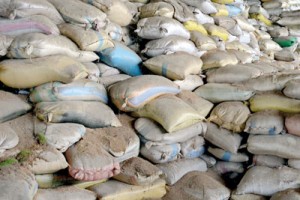News
No one to investigate millers poisoning rice in storage

Food safety and health officials, the consumer watchdog and the pesticide regulator are toothless in the face of the danger posed by pesticides that are freely being used in warehouses storing paddy
A highly toxic fumigant that can cause liver and kidney damage as well as damage to the lungs, nervous system and circulatory system, is allegedly being used in warehouses storing Sri Lanka’s staple food, rice.
But food safety and health officials, the consumer watchdog and the pesticide regulator are toothless in the face of the danger posed by pesticides that should not be used on raw agricultural produce.
A public health official says aluminium phosphide is being used to fumigate warehouses.
It reacts with the moisture in the air and produces phosphine gas which is the substance that is active as a pesticide, the US Environmental Protection Agency says. There are many products containing aluminium phosphide and they all poses an inhalation hazard to humans as well. It is categorised as having the highest toxicity and use is restricted.
The Pesticide Action Network says highly acutely toxic pesticides can be lethal at very low doses.
The alarm over the well-known use of the deadly pesticide by rice millers in warehouses was raised last week by a physician in Polonnaruwa.
Chief Medical Officer of Polonnaruwa Dr. Malin Methsuriya, said millers are using the pesticide to stock rice for extended periods.
Dr Methsuriya told the Sunday Times that he brought the practice to the notice of an agricultural committee meeting at the District Secretariat after being alerted by workers employed by millers.

Dr Channa Jayasumana
“Some mills store paddy for a couple of years although usually stocks can be retained only for one year,’’ he said.The head of the Department of Pharmacology at the Rajarata University, Dr Channa Jayasumana, said rice millers can stock the grain for years because of the use of chemicals against insects and fungal growth.Dr Jayasumana, who is also a senior lecturer at the Rajarata University, said organophosphates are being used by rice millers.
He said studies in rural areas have shown up chemical components in hair and urine samples collected from 50 adults. Chronic exposure to pesticides are higher than in foreign countries and there has been an increase in risks such as birth defects and still birth, cancer, diabetes, cardiovascular illnesses, respiratory as well as neurological diseases.
“Last year, over 28,000 cancer cases and 300 chronic kidney disease cases were found in the Rajarata area,’’ he said.
He said research is being done to establish how these chemicals which contribute to chronic illnesses were found in human hair of persons who have had no contact with pesticides.
“We spray poison directly onto our staple food. This is a crime,’’ he said.

Dr. Malin Methsuriya
He claimed that despite repeated warnings, the Pesticides Registrar, Consumer Affairs Authority, and health officials have not investigated the danger.The vice president of the Public Health Inspectors Union, H R S S P Herath, said that aluminium phosphide is used widely against insects.He said that such chemicals are illegal as well as red listed. But these are also imported.Herath said detection of their use by millers is difficult.
“It will take several months to get the results if samples of rice we collect during raids are provided to the government analyst or the Industrial Technology Institute,’’ he said.
He said at least Rs 30,000 is spent to check chemicals in grains.
Herath said testing equipment was badly needed.
While inspectors try to check rice storages every month, there are only 2,200 staff across the island to do the job. In Colombo and the suburbs one PHI has to be responsible for over 35,000 citizens.
Inspectors do not have protective gear either to enter warehouses that have been fumigated.
The Pesticide Registrar Dr Sumith Jayakody, said only registered pesticides are approved for use in warehouses.
“We take legal action against millers who spray pesticides directly onto rice, fines between Rs 50,000 to 500,000 are enforced, while a two-year jail term can also be imposed,’’ he said.
He explained that fumigation with chemicals is recommended before rice is stored. If used in gunny bags, the chemicals should dry off before rice is packed.
Dr Jayakody said complaints have been received about millers and rice storage owners illegally using chemicals on rice and other grains.
The director of the Consumer Affairs Authority, Chandrika Thilakatne, said the authority has no mandate to check rice mills and warehouses. “We only raid shops that sell poisoned, or expired rice.’’
All-Island Farmers Federation, general secretary, T B Sarath said the government is not able to investigate the chemical danger.
He said millers have imported rice and use chemicals to hold the stocks for longer.

